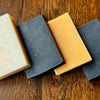Natural Soap Bar vs. Shower Gel: Which Is Better for Your Skin?

Choosing between natural soap bars and shower gel is more than just a matter of personal preference, it's a decision that impacts your skin health, your wallet, and the environment.
At Hiltwood, we’re committed to transparency and sustainability. Here’s a breakdown of the key differences between natural soap bars and shower gel, so you can make an informed choice.
Natural Soap Bars: Gentle, Sustainable, and Skin-Loving
Pure, Nourishing Ingredients
Natural soap bars are crafted from plant-based oils and butters (think olive oil, coconut oil, and shea butter) that cleanse without stripping away your skin’s natural moisture barrier. These ingredients are rich in vitamins, antioxidants, and essential fatty acids, providing hydration and nourishment with every wash.
Free from Harsh Chemicals
Unlike many shower gels, natural soaps are typically free from sulphates, parabens, artificial fragrances, and synthetic detergents. This makes them ideal for sensitive or easily irritated skin, reducing the risk of dryness, redness, or allergic reactions.
Long-Lasting and Cost-Effective
Solid soap bars contain minimal water, making them more concentrated and longer-lasting than liquid shower gels. This means you get more washes per bar, offering better value for money.
Retains Glycerin for Hydration
Natural soap bars retain glycerin, a natural humectant that attracts and locks in moisture, leaving your skin soft and hydrated.
Eco-Friendly Packaging
Most natural soap bars are packaged in biodegradable or recyclable materials, significantly reducing plastic waste compared to the single-use plastic bottles of most shower gels.
Shower Gel: Convenience with Environmental Drawbacks
Potential for Harsh Ingredients
Many commercial shower gels rely on palm oil derivatives, sulphates, and synthetic fragrances, which can disrupt your skin’s natural barrier and cause dryness or irritation, especially for those with sensitive skin.
Lower Concentration of Active Ingredients
Shower gels are mostly water, meaning you use more product per wash and get less active cleansing and nourishing ingredients per application.
Microplastics
Some shower gels contain microplastics or non-biodegradable exfoliants, which rub onto your skin and wash down the drain, contributing to waterway pollution and harming marine life.
Plastic Packaging and Waste
Most shower gels are sold in single-use plastic bottles, contributing to the global plastic pollution crisis. Even when recyclable, these bottles often end up in landfills or oceans, breaking down into harmful microplastics.
Bar Soap vs Shower Gel: Which Should You Choose?
| Feature | Bar Soap | Shower Gel |
|---|---|---|
| Cleansing Power | Deep, thorough clean | Effective, but may leave residue |
| Skin Benefits | Hydrating, gentle | Can be drying or irritating |
| Packaging | Minimal, eco-friendly | Plastic, less sustainable |
| Cost | More washes per bar | More expensive per use |
| Ingredients | Natural | Often synthetic, more preservatives |
| Lather | Creamy, nourishing | Foamy, but from surfactants |
| Versatility | Can be used for hands, shaving | Primarily for body only |
Why Hiltwood Natural Soap Bars Stand Out
Making the switch from shower gel to natural soap bars is a simple yet impactful way to care for your skin and the environment. With nourishing natural ingredients, no harsh chemicals, and a commitment to sustainability, Hiltwood’s natural soap bars offer a gentle, effective, and eco-conscious alternative to conventional shower gels.
-
Posted in
bar soap vs shower gel




